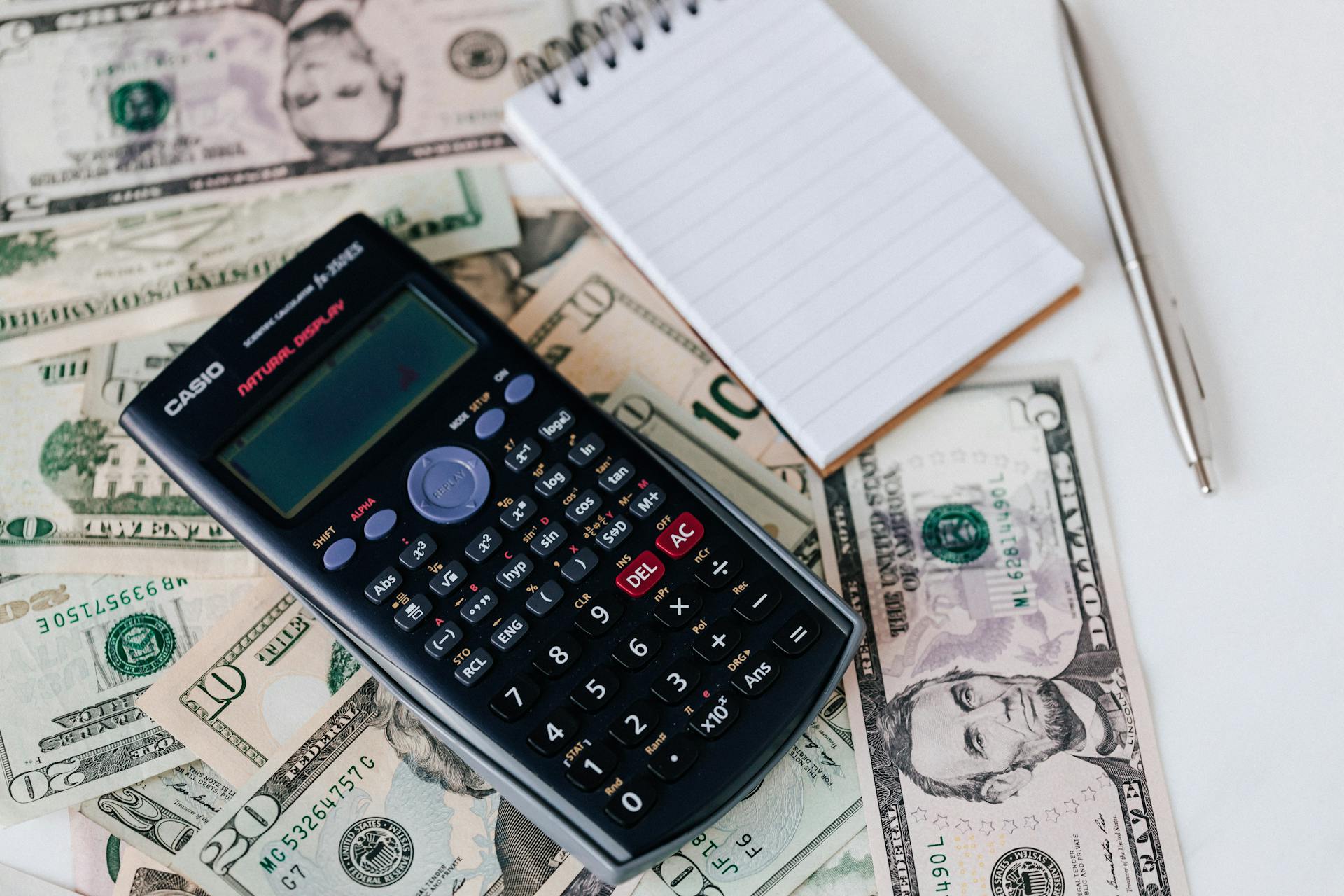
Buying a car at the end of a lease can be a great option, but it's essential to know what to expect. The price you'll pay is largely determined by the car's residual value, which is the estimated value of the vehicle at the end of the lease.
The residual value is typically calculated by the leasing company and can vary depending on the car's make, model, and condition. For example, a car that's well-maintained and in high demand may retain a higher residual value, while a car with high mileage or wear and tear may have a lower residual value.
To give you a better idea, let's consider the example of a Toyota Camry with 12,000 miles on it. According to the article, the residual value of this car is around 50% of its original purchase price. If the original purchase price was $25,000, the residual value would be $12,500.
Additional reading: Lease Then Purchase Car
When to Buy
If you're considering buying your car at the end of the lease, it's essential to weigh the pros and cons. Leasing can be a good idea if you want lower initial payments before committing to a car loan, and you're ready to drive a vehicle long-term.
Leasing with the intent to purchase could work if you add the total cost of leasing a car, including upfront fees, to the car's projected residual value at the end of the lease, and it's lower than the car's sale price, plus all fees and money factor over the life of the car loan.
However, if you're the type of driver who always wants the latest model, leasing might not be the best choice. Exceeding the dealer's mileage limits or the residual value at the end of the lease being much higher than anticipated can make leasing more expensive than buying outright.
To determine whether buying your car at the end of the lease is a good idea, consider the following factors:
- Compare the residual value of your vehicle with its current market value to ensure you're making a financially sound decision.
- Calculate the total amount you owe, including any remaining lease payments and the buyout price.
- Consider the depreciation and market value of the vehicle, as if the market value is less than the residual value, you may end up paying the difference.
Buying Out
Buying out your leased car can be a great option, but it's essential to consider the costs involved. Be wary of jumping the gun, as you'll need to think about the expected cost and the vehicle's condition.
The expected cost of buying out a car lease can be significant, with cars losing value quickly due to depreciation. In fact, you might be buying a depreciated vehicle, which can be a major drawback.
To get the best deal, shop around for loans and compare annual percentage rates (APRs) and terms from different lenders. This will help you secure the best possible loan for your buyout.
Here are the key pros and cons of buying out a car lease at a glance:
Buying Out: Pros and Cons
Buying out your car lease can be a great option, but it's essential to weigh the pros and cons before making a decision.
You know the car's history and any issues it may have, which can be a big advantage.
Depreciation is a significant con, as cars lose value quickly, and you might be buying a depreciated vehicle.
Avoiding lease-end fees is a significant pro, as you won't have to worry about excess mileage, wear-and-tear, or disposition fees.
Financing costs can add up, as loans for buyouts come with interest, which adds to the overall cost.
The buyout price might be lower than the car's current market value, which can be a potential cost savings.
Older cars may need costly repairs and maintenance, which can be a significant con.
You'll save the hassle of negotiating new leases, which can be a big pro.
Money spent on the buyout could be used for other investments or needs, which is an opportunity cost to consider.
You'll eventually own the car, unlike with leasing, which is a big advantage.
Committing to buyout limits your ability to switch to newer models or different vehicles frequently, which can be a significant con.
Here's a summary of the pros and cons in a table:
Acquisition

Acquisition is a crucial step in buying out a car lease. You'll need to secure funds to "buy" the car you had leased earlier.
To "purchase" your leased car, you will need capital. A car lease buyout loan is one option to consider unless you have a separate stash to fund your buyout process.
The amount of capital required will depend on the buyout price stated in your lease agreement. This is the price you'll need to pay to take ownership of the vehicle.
You can shop around for loans to compare annual percentage rates (APRs) and terms from different lenders. This will help you secure the best possible deal.
Keep in mind that a lease buyout loan is essentially a used car loan. As such, the interest rate and fees can be higher than those for a new car loan.
Here are some key points to consider when acquiring a loan for your car lease buyout:
- Loan amount: The amount of the loan will depend on the buyout price of your leased vehicle.
- Interest rates: Be prepared for higher interest rates and fees compared to a new car loan.
- APR comparison: Shop around to compare APRs and terms from different lenders.
Remember, it's essential to carefully review your loan options and terms to ensure you're getting the best deal for your situation.
Calculating Costs
Calculating costs is a crucial step in determining how much to buy your car at the end of a lease. The residual value of your car, as determined by the leasing company, is a key factor in calculating the buyout cost. This value is typically outlined in your lease agreement.
To determine the market value of your vehicle, you can use resources like the Kelley Blue Book car value calculator, which takes into account factors such as location, make and model, age, condition, features, and mileage. The market value will give you an idea of what a dealership or buyer would pay for your car.
A comparison between the residual value and market value can help you decide if a lease buyout is financially prudent. If your car's value is lower than the residual value stated in your contract, a lease buyout may not be the best option. You'll also need to factor in taxes and fees, such as local and state used car sales taxes, licensing or registration fees, and any purchase option fees or outstanding lease payments.
Here are the key costs to consider when calculating the buyout price:
- Residual value (as determined by the leasing company)
- Market value (using a resource like Kelley Blue Book)
- Taxes (local and state used car sales taxes)
- Fees (licensing or registration fees, purchase option fees, and outstanding lease payments)
Driving Time
If you hope to buy or lease the newest model in less than two years, it doesn’t make sense to lease and then purchase the vehicle.
You'll likely owe more than the car is worth if its residual value decreases and you decide to keep the car for a short period.
There is no way to know if your car’s residual value will increase or decrease over the lease term.
You might like: What Is a Residual on a Car Lease
Annual Driving Distance
Annual driving distance can have a significant impact on your vehicle's lease costs. Leases often come with annual mileage limits, typically 10,000, 12,000, or 15,000 miles. Exceeding these limits can result in excess mileage fees.
If you drive more than the allowed miles, purchasing your vehicle after the lease might be a cost-effective option. However, be aware that these fees can outweigh the price you'll pay to purchase the vehicle.
Cost: A Guide
Calculating the cost of a lease buyout can be a straightforward process if you know what to expect. The residual value of your car, which is determined by the leasing company, is a crucial factor in determining the buyout cost.

To calculate the buyout cost, you'll need to research the market value of your vehicle, which can be done using resources like the Kelley Blue Book car value calculator. This will give you a good idea of what your car is worth in the current market.
A comparison between the residual value and the market value will help you determine if a lease buyout is financially sound. If the market value is lower than the residual value, a lease buyout may not be the best option.
In addition to the buyout cost, you'll also need to factor in taxes and fees, such as local and state used car sales taxes, licensing or registration fees, and any outstanding lease payments.
Here's a breakdown of the estimated costs you may incur during a lease buyout:
Your credit score can also impact the financing options available to you, with some lenders offering auto loan rates for lease buyouts at the same rates as their new or used loan options.
A fresh viewpoint: Medical Equipment Financing Rates
Weigh Financing Options
Get at least three different auto loan rates for a car purchase or a lease before signing off. This will give you a better chance of receiving a good deal.
Shopping for a lease buyout loan should be approached with the same care as securing a traditional loan. Many lenders offer these types of loans at the same rates as their new or used loan options.
You can get loan rates from lenders like Gravity and Auto Approve. They offer loan options at the same rates as their new or used loan options.
Carefully considering your financing options is crucial when buying out a car lease. It will help you determine whether buying the car you've been driving or leasing a different vehicle will be more affordable over time.
Curious to learn more? Check out: Buying Flooring
Understanding the Process
To understand the process of buying your car at the end of a lease, it's essential to grasp the concept of a lease buyout. A lease buyout refers to the process of acquiring your leased vehicle either before or at the end of the lease term, which involves paying a sum known as the buyout cost.
Related reading: What to Do at the End of a Car Lease
The buyout cost is equivalent to the residual value that the leasing company initially estimated the vehicle would retain at the lease term's conclusion, along with any applicable taxes, fees, and outstanding lease payments. It's crucial to review your lease agreement to ensure that this option is available.
Two primary options for lease buyouts dictate when you can complete the buyout process: Lease-End Buyout and Early Lease Buyout. Here are the key differences between the two:
How It Operates
There are two primary options for lease buyouts: Lease-End Buyout and Early Lease Buyout. A Lease-End Buyout allows you to purchase the vehicle when the lease concludes, which can be a practical choice if you have a fondness for your car and prefer to avoid the complexities of starting a new lease or acquiring a new vehicle.
The buyout cost for a Lease-End Buyout is typically the residual value that the leasing company initially estimated the vehicle would retain at the lease term's conclusion, along with any applicable taxes, fees, and outstanding lease payments. This can be a financially advantageous option if the car's market value exceeds the buyout cost.

An Early Lease Buyout involves buying the vehicle before the lease contract's scheduled end, which may be the best course of action if you are concerned about excess wear and tear or mileage fees associated with breaching your lease agreement. However, this option can be costly if your leasing company imposes early termination fees on top of the buyout price.
To determine which option is best for you, consider the following factors:
Ultimately, the decision to opt for a Lease-End Buyout or Early Lease Buyout depends on your individual circumstances and financial situation.
Sound Decision?
A car lease buyout can be a sound decision if the market value of the vehicle exceeds the buyout price.
If your attachment to the car is strong, you might consider proceeding with the buyout even if it entails a cost that surpasses the vehicle's market value.
The timing and financing considerations about your vehicle's value and condition are crucial to making an informed decision.
Familiarize yourself with your lease agreement's terms to ascertain your eligibility for a lease buyout and the potential associated fees.
A lease buyout may not be financially prudent if the car's buyout price surpasses its market value, as in the case where the buyout price is $10,000, but the car's value is only $7,500.
Exploring trading the vehicle for a new lease may be a more sensible option in this scenario.
Broaden your view: Spot Price vs Strike Price
Frequently Asked Questions
How do you calculate the value of a car at the end of a lease?
The value of a car at the end of a lease is calculated by adding the residual value, total remaining payments, and any applicable lease buyout fee. This total is typically listed on your monthly leasing statement as the "buyout amount
Can you negotiate the buyout price at the end of a lease?
You can negotiate the buyout price at the end of a lease, but the initial price is often set in the contract based on the vehicle's residual value. Negotiation may be possible, but it's best to review your contract and consider starting a conversation with the leasing company.
Sources
- https://www.bankrate.com/loans/auto-loans/buying-out-a-car-lease/
- https://www.federalreserve.gov/pubs/leasing/resource/consider/endclosed.htm
- https://cartelligent.com/should-you-buy-your-leased-vehicle-lease-end/
- https://diminishedvaluecarolina.com/lease-buyout-cost-a-guide-to-help-calculate
- https://www.coolcredit.com/blog/buying-out-a-car-lease/
Featured Images: pexels.com


